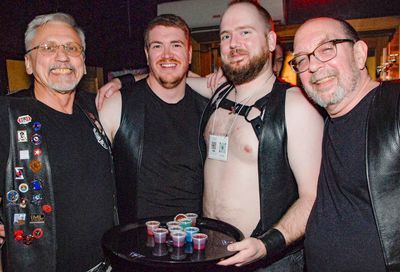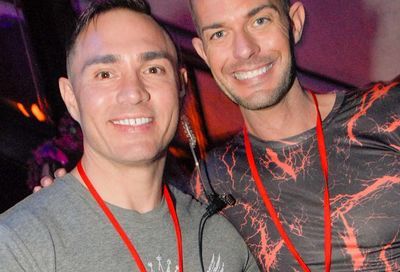Gay dating app Hornet wants to clamp down on “imposters and manipulators” in new update
A new update aims to tackle catfishing and spam accounts by verifying real users

“Impostors and manipulators are everywhere,” says Christof Wittig, the CEO of Hornet Networks Ltd., the parent company of gay dating app Hornet. “In fact, it’s all rage about misinformation, impostors, just talk about all of the bots that comment on Facebook posts. Pretty much the entire nation is suffering from misrepresentation of who people really are.”
It’s a problem that has become rampant on some dating apps, which are rife with bots, fake profiles, stolen images, and instances of catfishing — among other problems.
In an attempt to tackle the problem, Hornet’s recently released sixth version of its app comes with additional features designed to help with identity authentication. In short, it will automatically verify users to let others know who is “real,” and who might be a spam bot masquerading as a handsome hunk.
Unlike other dating apps, which are largely GPS-based and contain profiles where users answer predetermined questions, Hornet is more akin to Instagram, where users can post photos, videos, and links to articles and create “moments” that capture aspects of their daily lives. Other users can react to those “moments” and follow that person’s livestream, as well as start individual conversations, and “like” and reshare posts.
“The core idea is to allow people to open up more authentically on a gay app…to allow people to socially connect over their interests and in a much broader form than the more relationship-oriented apps that typically define the category,” Wittig says.
To help users distinguish between genuine users and bots or potential catfishers, Hornet has developed a first-of-its-kind verification system that uses a special algorithm to help distinguish and identify legitimate profiles, using the types and frequency of posts on a user’s feed, and their level of interaction with other users.
“People engage, and based on that engagement, you can very easily detect whether that person is authentic or uses a certain misrepresentation pattern, and every pattern is picked up by machines,” says Wittig, who, understandably, remains tight-lipped on the specifics of the algorithm.
“So you show you actually live, you breathe, you have a life. We analyze, with the machine learning algorithms, what you post, what you tell about yourself and how other community members react to such posts or disclosures,” he adds. “So if you post something which is genuine and people genuinely react to it, the machine learning algorithm picks up on this. Let’s say you just use a celebrity’s profile photo and everyone says, ‘Yeah, what, what the hell, you’re not real.’ Or even reports them as scammers. Then the machine also understands that pattern and based on this pattern, the machine learns to understand who is more authentic or not.”

Once a person has been verified, they’ll receive an orange Hornet badge on their profile — indicating to other users that the person shown in the profile is more than likely who they say they are.
“The badge makes it super easy,” says Wittig. “It’s a very clear, clear signal that this is a person that’s been vetted by machine and community into this very powerful combination because neither machine can be smart enough nor the community can really do that at scale and detect this pattern.”
If a person doesn’t have enough activity in their timeline to be verified and doesn’t yet have a badge, they’ll still be able to use the app. That’s where another new feature of Hornet’s Version 6 comes in: the bifurcated inbox.
Verified users’ requests and conversations that a person initiates themselves end up in a primary inbox, while unverified users end up in a recipients’ “requests” inbox, where they can exercise caution and their own discretion when deciding whether to interact with a user.

Wittig says the authentication algorithm, coupled with the bifurcated inbox, can achieve Hornet’s goal of providing a safe space for LGBTQ people to be themselves while avoiding users who may wish to entrap, harm, or blackmail them, or — in countries where homosexuality is criminalized — attempt to have them arrested.
While there’s also a tab that allows users to see nearby profiles, Hornet intentionally disallows triangulation, which police have used in other countries to entrap or arrest men for suspected homosexuality. As such, the app’s technology obfuscates a person’s location and enables them to exercise their own judgment when using Hornet.
“Hornet is a safe space for people to express themselves, who they really are, so they don’t get entrapped or misled,” says Wittig. “And that’s I think, is what we try ultimately to do: let people connect to the community anytime, anywhere, where they are and disclose who they really are with all their idiosyncrasies. And based on that disclosure, they’re awarded with rich connections and people engaging with who they are rather than with something they pretend to be or think they need to be in order to get message feedback.”
Hornet available for free in the Apple App Store and Google Play Store.
Related:
Grindr and other gay dating apps are exposing users’ exact location
The U.S. government believes Grindr is a national security risk. Yes, really.
Read more:
Georgia Republican wants to make helping transgender children transition a felony
Republicans won’t stop killing LGBTQ rights in Virginia: A historical view
Pete Buttigieg says homophobic world leaders will “have to get used to” a gay president
Support Metro Weekly’s Journalism
These are challenging times for news organizations. And yet it’s crucial we stay active and provide vital resources and information to both our local readers and the world. So won’t you please take a moment and consider supporting Metro Weekly with a membership? For as little as $5 a month, you can help ensure Metro Weekly magazine and MetroWeekly.com remain free, viable resources as we provide the best, most diverse, culturally-resonant LGBTQ coverage in both the D.C. region and around the world. Memberships come with exclusive perks and discounts, your own personal digital delivery of each week’s magazine (and an archive), access to our Member's Lounge when it launches this fall, and exclusive members-only items like Metro Weekly Membership Mugs and Tote Bags! Check out all our membership levels here and please join us today!
























